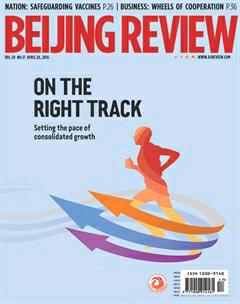A Matter of Life and Death
2016-05-04ByYuanYuan
By+Yuan+Yuan
Six operations a day, more than 30 years in a row, no vacation, no spare time. Meet Liu Peng, who has been working as a cardiac surgeon in the Beijing-based China-Japan Friendship Hospital since 1984.
“I come to the office at 8 a.m. and start operating right away,” Liu, Director of the Department of Cardiovascular Surgery and Electro-chemotherapy in the hospital, told Beijing Review. “It is normal [for me] to leave the operation theater at 8 or 9 oclock in the evening every day, including the weekends. This is my routine schedule.”
“Theres almost no spare time for my family and myself,” he said.
The overpowering workload is common for many medical staff in China, especially those in hospitals in big cities as patients swarm the leading hospitals in big cities for better treatment.
Risk and reward
“My patients normally have major cardiac and vascular problems. Each operation is a matter of life and death,” the 55-year-old said.
Five years after he started to work in the hospital, Liu was assigned to the Nihon University in Japan for further studies. He spent five years there, acquiring advanced medical knowledge and operation skills.
While studying abroad, Liu noticed that even though many senior citizens in foreign countries have hyperlipidemia, or high levels of fat in the blood, they rarely get strokes. Then he learnt that it is because when such people are diagnosed as having blocks in their arteries, they undergo an operation to have them removed. The operation is called carotid endarterectomy.
In China, with the rise in living standards in recent times, high blood pressure, high blood sugar and hyperlipidemia—called the“three highs”—have become common. But as no doctors did the operation in China at that time, there was a high incidence of such strokes.
Liu returned to his Beijing hospital in 1994 and performed the first carotid endarterectomy in 2000. The whole process took over two hours, following which the patient recovered. Since then, Liu has done more than 1,000 such operations with his team.
Patients with problems in the carotid arteries mostly have problems in their coronary arteries as well. But separate operations would make them face higher risks. After checking the physical conditions of a patient who had problems in both sets of arteries, Liu, who had by then become proficient in carotid endarterectomy, decided to combine the heart bypass surgery and operations on both carotid arteries together —to finish three operations at the same time.
The first combined operation, done in January 2014, lasted for about five hours. Since then Liu has done more than 70 such operations. “It is very tiring for the doctors but patients dont have to suffer two operations, which is a big relief for them. Seeing the smile on a patients face is my biggest reward,” Liu told Beijing Review.
True grit
The man with the courage that drives him to do such daring operations once dreamt of becoming a solider.
“My dream was to be a solider but sadly, it never came true,” Liu said. “Operating on patients can be compared to fighting on the battlefield. Thats how great it feels and why I love my job.”
In 2003, when China was in the throes of Severe Acute Respiratory Syndrome (SARS), Liu led the work in the infectious diseases department, treating SARS patients. It was at an early stage of the SARS epidemic and there was no comprehensive information on how the disease spread. Still Liu undertook the task without hesitation, not leaving the hospital for more than two months.
For him, it was like riding armed to the battle. It was all about responsibility and not turning back.
However, disputes between doctors and patients have become a major issue in Chinas medical sector in recent years. Can this affect doctors dedication to their profession?
Liu thinks the reason for such disputes lies partly in the lack of communication between the two sides.
“Some patients have high expectations of renowned hospitals and think doctors can cure everything,” he said. “This is not rational. They should realize that every operation has risks. Even though they sign up for operations after being informed about the risks, they refuse to believe the worst scenario could become true.”
Often, when patients learn they cant be cured, some vent their anger on the medical staff and even attack them.
“But I would say the majority of patients are very nice and show great understanding of our work,” Liu said. “Even if there are some disputes, when I am at the operating table, I focus only on the patient and the operation.”
